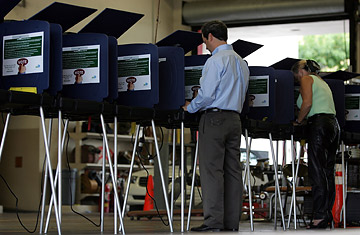
A man casts his vote in Miami, Florida.
In Florida, where just 537 votes determined the victory for George W. Bush in the 2000 presidential election, officials remain especially conscious of an effort to make sure everyone eligible can vote, just not at the expense of potential voter fraud. Those two competing interests are at issue in a federal voter registration lawsuit argued this week, and expected to be decided next week, in Gainesville, which could affect whether tens of thousands of citizens who reside in the state will have their vote count in upcoming elections.
The case concerns a Florida statute that went into effect on Jan. 1, 2006, which requires election officials to match information provided on voter registration applications — such as name, address, date of birth, Social Security number, and driver's license number — against data in official records before an individual can be registered to vote. The problem is that even a simple error such as a typo can keep a legitimate voter off the registration rolls. Compounding that issue is the state's large number of citizens with Haitian or Hispanic names that are either hyphenated or use multiple surnames. Opponents of the bill say that the matching process so far has delayed or denied voter registration for more than 76,000 Florida citizens, with more than 14,000 still blocked from the rolls. That number is expected to rise dramatically as registration drives get under way for the 2008 presidential election.
"It could be the number, it could be the name was improperly typed in," says senior counsel Elizabeth Westfall with the Advancement Project, a civil rights group that, along with several other lawyers, represents the plaintiffs — Florida's NAACP, the Southwest Voter Registration Project, and the Haitian-American Grassroots Coalition. They are suing Florida Secretary of State Kurt S. Browning, who oversees elections in the state, arguing that the law is unconstitutional and should be immediately suspended. U.S. District Judge Stephen P. Mickle in Gainesville heard roughly four hours of oral arguments in the case on Tuesday.
Last year, a federal court in Washington State threw out a "no match, no vote" law. Since then several states, including California, Maryland, North Carolina, Pennsylvania and Texas, have voluntarily dropped similar policies. The current case is one of many controversial voter identification lawsuits being heard in courts around the country. The most notable, concerning an Indiana law, is slated to be heard by the Supreme Court early next year.
Attorneys for the state of Florida, in court documents, referred to the law as a "common-sense anti-fraud measure" and pointed out that the federal Help America Vote Act of 2002 requires everyone who signs up to vote and has a driver's license to provide that number on the application. All other applicants should provide the last four digits of their Social Security number (provided they have one).
The Florida law simply takes it one step further, says Lynn Hearn, general counsel for the Florida Department of State. "It wouldn't make sense to go to all that trouble that even if they don't match we're going to go ahead and register them anyway," she says. Hearn also points out that since Jan. 1, 2006, some 1.5 million voters have been registered in Florida. While conceding that 14,000 other applicants have yet to get on the voter rolls, Hearn maintains that her main concern pertains to the potential for fraud with absentee ballots. "Our concerns lie not in the in-person voting but in the absentee voting where a person doesn't have to go to the polls," Hearn says. "Once they get registered they can vote absentee. That's extremely difficult to detect."
Opponents of the bill reject that argument, claiming there are already criminal laws on the books in Florida prohibiting fraudulent absentee voting, carrying with them a maximum sentence of five years in prison. "When you do your absentee, if I'm not mistaken, they have to certify on that particular absentee ballot that they are who they say they are," says Dianne Wheatley-Giliotti, president of the League of Women Voters of Florida, which is not formally involved with the suit. "To fraudulently swear you are in violation of the law — if someone willingly does this, they are subject to laws."
Minority voters, critics claim, are disproportionately affected by the law. For example, Hispanics, who often use two last names, make up "only 15% of the applicants, but they are almost 40% of the unmatched" cases, according to attorney Myrna Perez of the Brennan Center for Justice at the NYU School of Law, who also represents the plaintiffs. Similarly, African Americans make up 13% of the applicants but account for 26% of the cases where the names or driver's license or Social Security numbers on the applications don't match those in the official databases. "Perfectly eligible real people are not getting registered," says Perez.
Brian Mellor, election counsel with Project Vote, has worked on the case and maintains there are enough safeguards in place to prevent someone from filling in a fake voter application and then voting — which explains the fact, he argues, that fraudulent voting has not been a problem. "If a false person submits an application for Dick Tracy, a person has to show up at the polls with Dick Tracy on the driver's license," Mellor says. "There needs to be a lot more than just filling out a fake voter application to get to vote."
